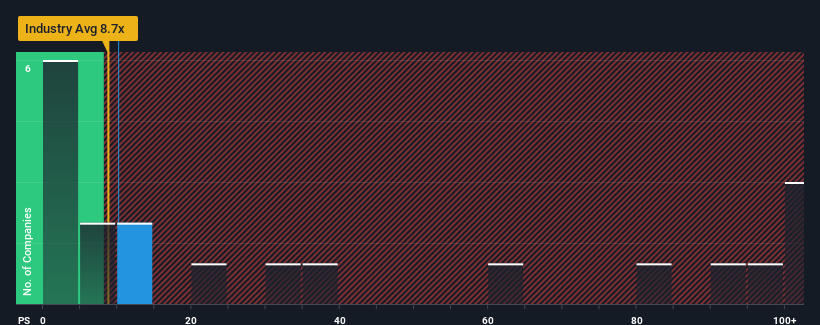Little Excitement Around Japan Tissue Engineering Co., Ltd.'s (TSE:7774) Revenues

Japan Tissue Engineering Co., Ltd.'s (TSE:7774) price-to-sales (or "P/S") ratio of 10.1x might make it look like a buy right now compared to the Biotechs industry in Japan, where around half of the companies have P/S ratios above 18.5x and even P/S above 90x are quite common. However, the P/S might be low for a reason and it requires further investigation to determine if it's justified.
Check out our latest analysis for Japan Tissue Engineering

What Does Japan Tissue Engineering's Recent Performance Look Like?
With its revenue growth in positive territory compared to the declining revenue of most other companies, Japan Tissue Engineering has been doing quite well of late. It might be that many expect the strong revenue performance to degrade substantially, possibly more than the industry, which has repressed the P/S. If you like the company, you'd be hoping this isn't the case so that you could potentially pick up some stock while it's out of favour.
If you'd like to see what analysts are forecasting going forward, you should check out our free report on Japan Tissue Engineering.How Is Japan Tissue Engineering's Revenue Growth Trending?
In order to justify its P/S ratio, Japan Tissue Engineering would need to produce sluggish growth that's trailing the industry.
If we review the last year of revenue growth, the company posted a terrific increase of 24%. As a result, it also grew revenue by 11% in total over the last three years. Therefore, it's fair to say the revenue growth recently has been respectable for the company.
Turning to the outlook, the next three years should generate growth of 26% each year as estimated by the one analyst watching the company. Meanwhile, the rest of the industry is forecast to expand by 33% per year, which is noticeably more attractive.
In light of this, it's understandable that Japan Tissue Engineering's P/S sits below the majority of other companies. It seems most investors are expecting to see limited future growth and are only willing to pay a reduced amount for the stock.
What Does Japan Tissue Engineering's P/S Mean For Investors?
It's argued the price-to-sales ratio is an inferior measure of value within certain industries, but it can be a powerful business sentiment indicator.
As we suspected, our examination of Japan Tissue Engineering's analyst forecasts revealed that its inferior revenue outlook is contributing to its low P/S. Shareholders' pessimism on the revenue prospects for the company seems to be the main contributor to the depressed P/S. Unless these conditions improve, they will continue to form a barrier for the share price around these levels.
And what about other risks? Every company has them, and we've spotted 1 warning sign for Japan Tissue Engineering you should know about.
If these risks are making you reconsider your opinion on Japan Tissue Engineering, explore our interactive list of high quality stocks to get an idea of what else is out there.
New: Manage All Your Stock Portfolios in One Place
We've created the ultimate portfolio companion for stock investors, and it's free.
• Connect an unlimited number of Portfolios and see your total in one currency
• Be alerted to new Warning Signs or Risks via email or mobile
• Track the Fair Value of your stocks
Have feedback on this article? Concerned about the content? Get in touch with us directly. Alternatively, email editorial-team (at) simplywallst.com.
This article by Simply Wall St is general in nature. We provide commentary based on historical data and analyst forecasts only using an unbiased methodology and our articles are not intended to be financial advice. It does not constitute a recommendation to buy or sell any stock, and does not take account of your objectives, or your financial situation. We aim to bring you long-term focused analysis driven by fundamental data. Note that our analysis may not factor in the latest price-sensitive company announcements or qualitative material. Simply Wall St has no position in any stocks mentioned.
Have feedback on this article? Concerned about the content? Get in touch with us directly. Alternatively, email editorial-team@simplywallst.com
About TSE:7774
Japan Tissue Engineering
Engages in the regenerative medicine business in Japan.
High growth potential with excellent balance sheet.
Market Insights
Community Narratives



